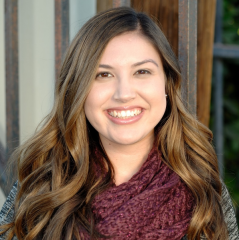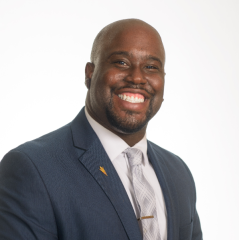Watts College students, alumni tackle the COVID-19 pandemic on the front lines at vaccination sites

Paige Corbin, a tourism development management (meetings and events) major in the School of Community Resources and Development in ASU's Watts College of Public Service and Community Solutions, speaks with someone about to receive a COVID-19 vaccine at State Farm Stadium. Photo by Erin Schneiderman
The good news, of course, is that more and more Arizonans are receiving COVID-19 vaccines, with tens of thousands getting vaccinated in parking lots at large sports stadiums. But the daily challenge is to organize hundreds of supervisors and volunteers to help get that lifesaving medicine from dozens of boxes of vials and into the arms of so many lining up in all those vehicles.
Students and alumni from Watts College of Public Service and Community Solutions are there, putting their acquired knowledge to work during the public health crisis in ways few could have imagined a year ago, working all hours to make sure as many people as possible receive their shots as quickly and efficiently as possible.
About 40 students who are members of the Watts College-based Public Service Academy’s Next Generation Service Corps are joined by about 80 students from the Watts-based School of Community Resources and Development.
Throughout the spring semester they have been performing a wide variety of functions at State Farm Stadium in Glendale and Phoenix Municipal Stadium on the Tempe border.
Those working at the State Farm Stadium site earned national attention for their efficiency in administering vaccines to large numbers of people. President Joe Biden and Vice President Kamala Harris virtually toured the site in February, after which they thanked those working there for their dedication and complimented them for staffing a vaccination site that is a role model for others nationwide.
Arizona is among the top three states in the nation for getting the COVID-19 vaccine to vulnerable communities, according to a March 17 report by the federal Centers for Disease Control and Prevention quoted in an Arizona Department of Health Services statement. The CDC report found that Arizona had the third-highest vaccination coverage for high-vulnerability counties as determined by the Social Vulnerability Index, a nationally accepted framework.
Breanna Carpenter, assistant director, ASU Research Enterprise, is a Watts College of Public Service and Community Solutions alum.
Breanna Carpenter, assistant director of ASU Research Enterprise, the university’s applied research and development arm, and fellow Watts College alum Marcus Jones, assistant director for special projects at the College of Health Solutions, were instrumental in organizing the logistics for the COVID-19 testing efforts before the vaccinations began, said Watts College Dean Jonathan Koppell.
“Bre and Marcus did such an admirable job planning the administration of COVID tests,” Koppell said. “They continued to show their superior organizational abilities as they played key roles in leading the vaccination rollout at the stadiums. They are among so many of our students and alumni who are doing the kind of vital, important work that President Biden and Vice President Harris took notice of and highly praised.”
Carpenter holds a bachelor’s degree and two graduate degrees from Watts College. She received her Master of Social Work and Master of Public Administration degrees in May 2020.
She said volunteers trained by students are working every shift at the stadium vaccination sites.
“They’re doing patient check-in, observation, registration, hospitality, getting supplies, being zone supervisors,” said Carpenter, Watts College’s former events coordinator, who has been overseeing efforts at Phoenix Municipal Stadium.
Marcus Jones, assistant director for special projects, College of Health Solutions, is a Watts College of Public Service and Community Solutions alum.
Jones said several students now working with him at State Farm Stadium are taking his special event programming class (PRM 422). The opportunity to connect their academic knowledge with the hands-on experience they’re gaining at the drive-thru vaccination sites is invaluable, he said.
“Our students are phenomenal. They’re taking what they learned in course work and are applying it,” said Jones, who received a bachelor’s degree in public service and public policy from the School of Public Affairs in 2013. “They’re learning how to think on their feet, and if they don’t know how to do something, they learn how to work up the chain of command.”
He added, “I’m an event planner by trade but I consider myself an educator first. I’m training the next generation of event planners right now and can’t think of a better experience than to give them this opportunity.”
Another Watts graduate, Steven Latino, ASU Research Enterprise's director of research and applied services, spent several weeks supervising efforts at State Farm Stadium, which logged its 500,000th vaccination on March 15.
He said the 24-hour operation has grown to the point where there’s no slow period, even in the middle of the night. Regardless, the team has consistently demonstrated it can handle the volume.
“We’re only limited by the number of doses in the freezer,” he said.
Latino received his bachelor’s degree in public service and public policy from the School of Public Affairs in 2019, and is currently working toward a Master of Public Administration degree.
Brett Hunt, executive director of the Public Service Academy, said work at the vaccination sites is part of Watts College’s ethic of problem-solving.
“All those types of things, all the way up to hopefully solving the pandemic itself. It’s testimony to the kinds of students we’re lucky to work with,” he said.
At the two stadium vaccination sites, students, who are being paid for their efforts, are serving as leads in charge of up to 20 volunteers each, who arrive daily to donate time to assist, Hunt said. Students teach volunteers how to check people in, prepare them for their vaccinations and schedule appointments for their second doses.
Also overseeing volunteers and performing other similar tasks are students in the School of Community Resources and Development's special event management program, supervised by Erin Schneiderman, a clinical assistant professor in the school.
“This operation truly is an event,” Schneiderman said. “From traffic management, safety and security, staffing, hospitality, volunteer recruiting, ADA, technology, communications and conflict management, this environment offers so many valuable lessons for our students to learn.”
Schneiderman said through March 29 her students worked more than 5,000 hours, combined, at both stadiums.
Luis Pintor Zavaleta, a management and tourism business sophomore helping those getting vaccines at State Farm Stadium, said by being there he’s been able to connect what he’s learned in his classes into real-life situations.
“I often relate terms and lessons from my TDM (tourism development and management) classes,” Zavaleta said. “I enjoy working at the site, because I am able to be a part of an historic movement in one of the largest vaccine sites in the country.”
Other Watts College students are also making a difference in the vaccination rollout, even though they aren’t working at vaccination sites. Hunt said many such students are among those staffing Maricopa County’s 2-1-1 call-in line, helping older adults and others who have experienced difficulties getting appointments to receive their COVID-19 vaccinations. The outreach provides callers with access to several public- and private-sector resources, including vaccination appointments.

